Abstract
OBJECTIVES: This report measures the extent of health knowledge and preventive behaviors of African-American and Afro-Caribbean women in New York City. METHODS: Two-hundred-twenty-one females in 10 Brooklyn-area beauty salons were surveyed in mid-June 2004. Participants completed a 30-item questionnaire (Cronbach's alpha=0.76) focusing on six domains: heart health, breast health, prostate health, second-hand smoke, asthma and sexual health. The instrument included 10 items on preventive behaviors related to the aforementioned domains. Mean knowledge scores were calculated, and analyses were performed to evaluate the factors associated with higher knowledge scores and with greater likelihood of preventive health behaviors. RESULTS: Despite a high level of knowledge about risk factors and symptoms for several common diseases, a large percentage of the sample engaged in high-risk behaviors. In addition, higher knowledge scores were associated with family history of heart disease (p=0.035), family history of prostate cancer (p=0.032) and being a member of an HMO (p=0.001). Higher scores, in turn, were associated with not currently smoking (p=0.049) and going for a blood cholesterol screening in the past year (p=0.045). CONCLUSION: Future intervention efforts should place greater focus on educating participants about symptoms and risk factors for commonly occurring diseases in the community, and on generating behavioral changes.
Full text
PDF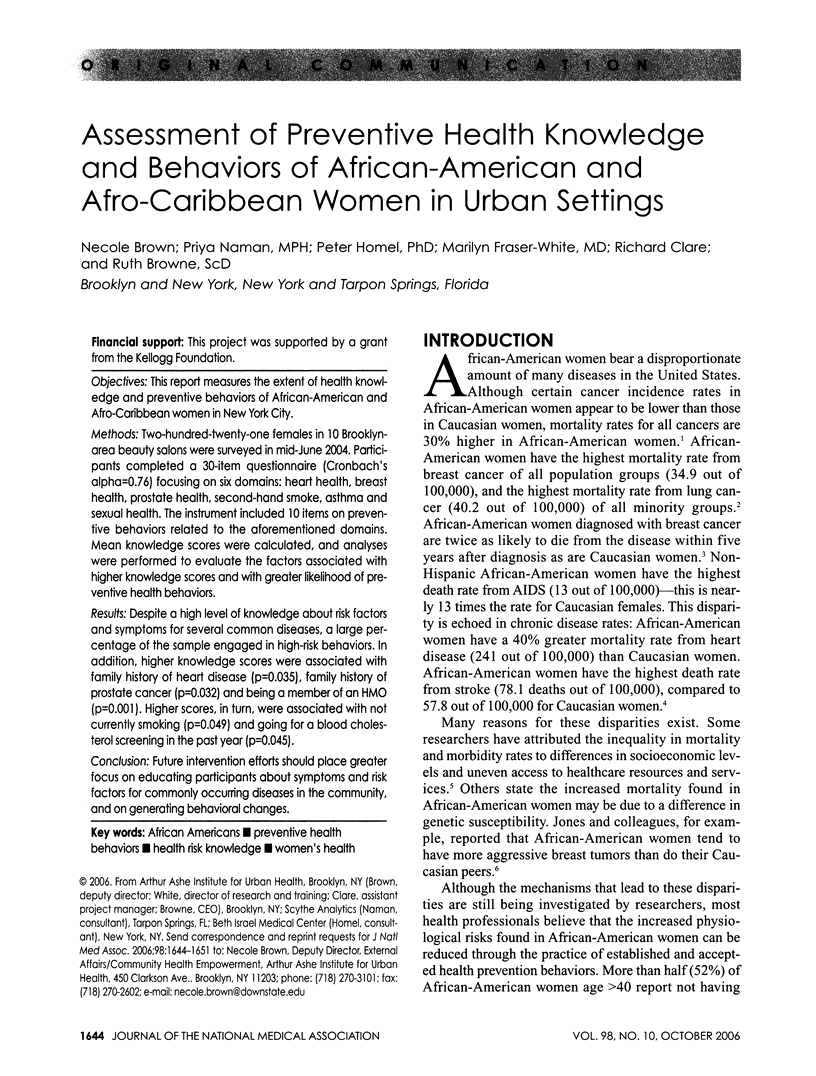
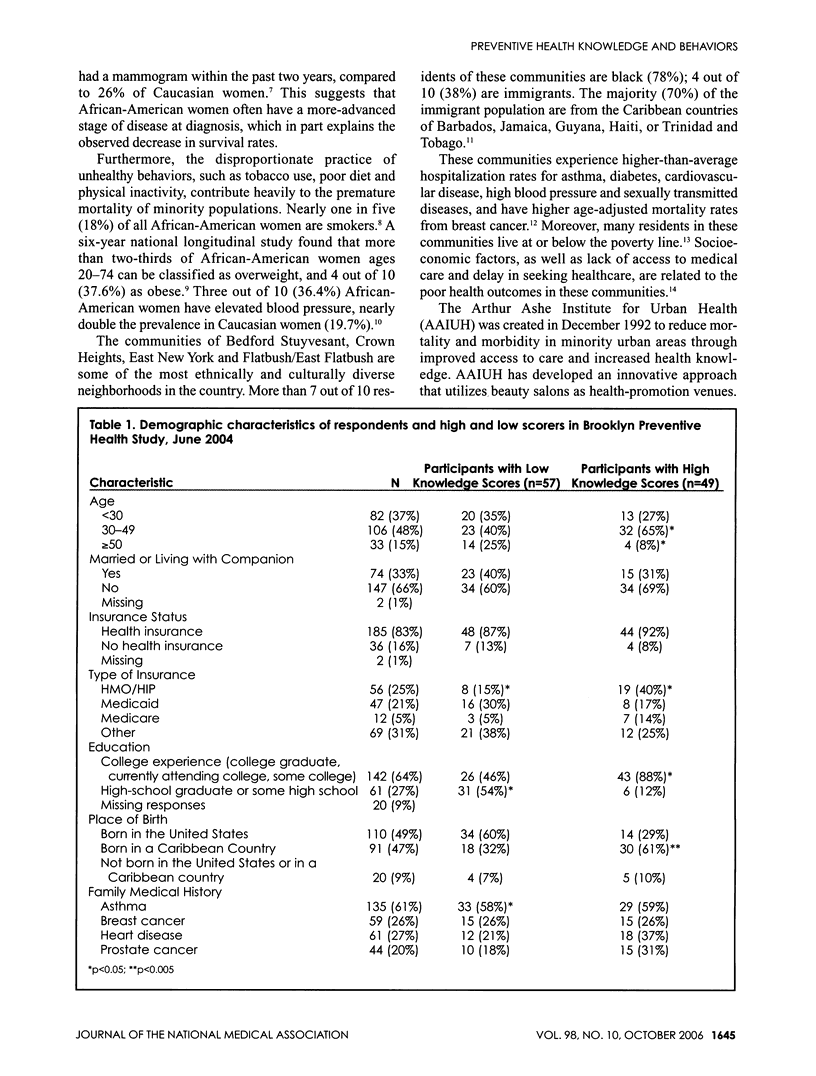
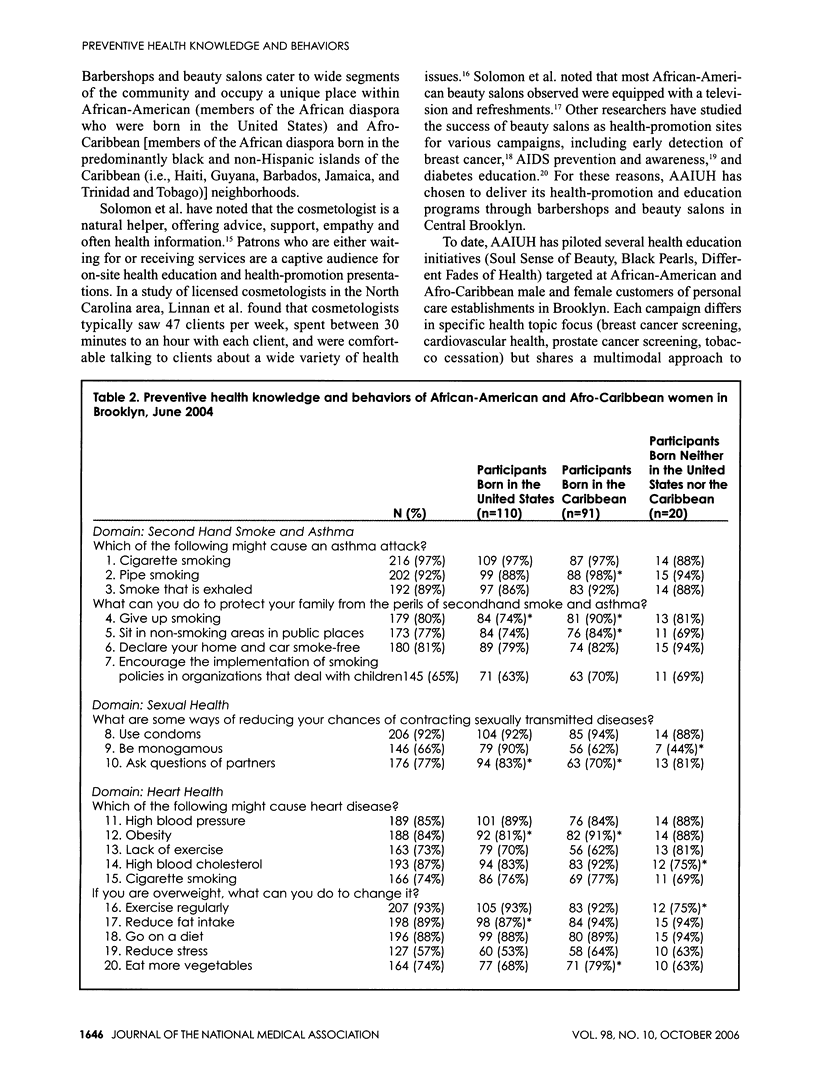
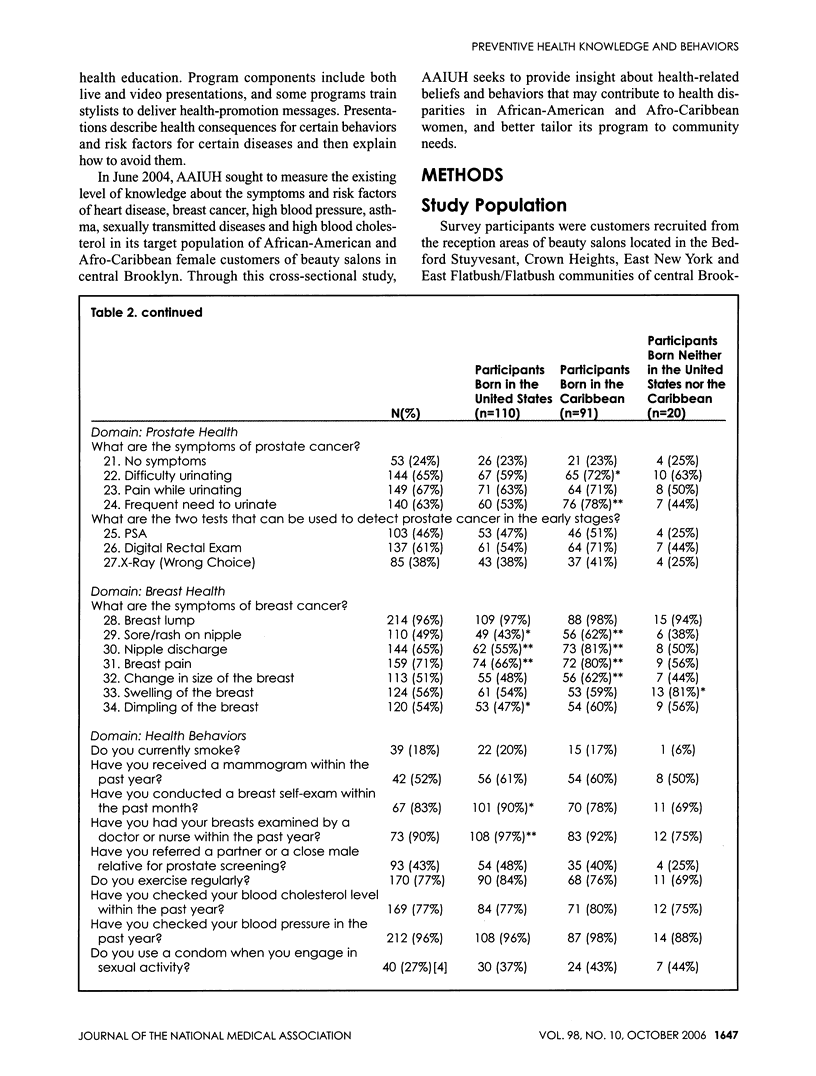
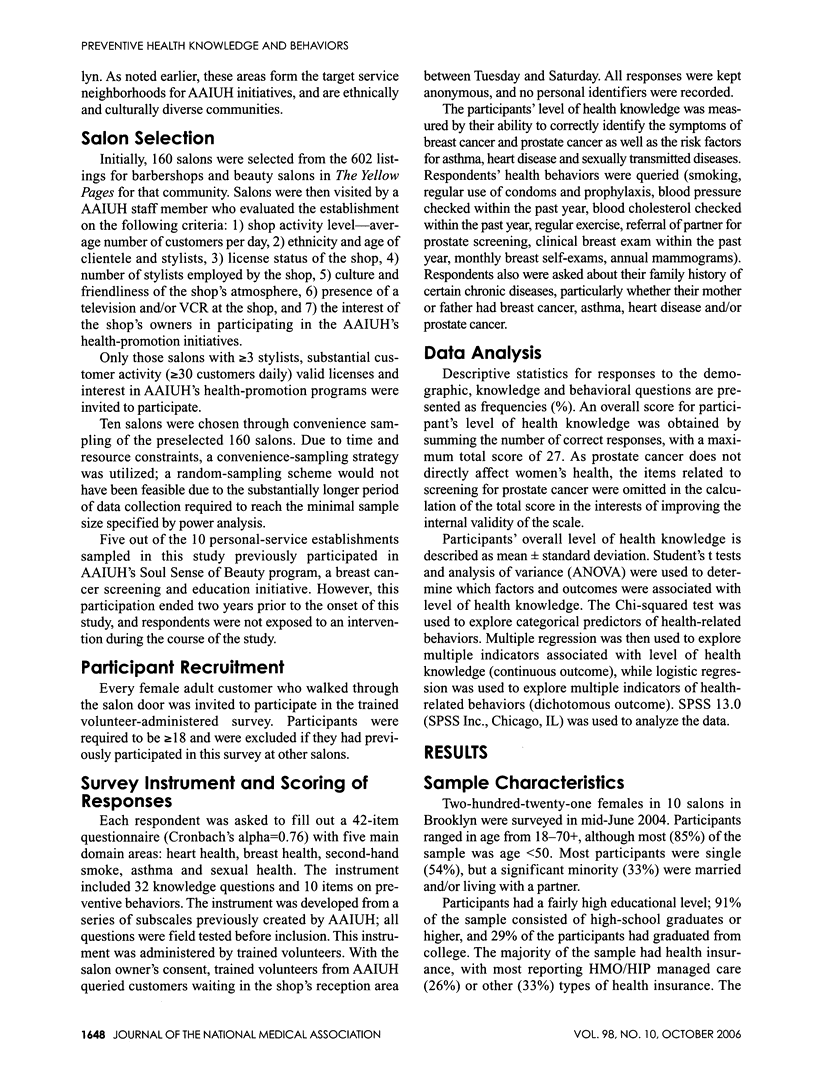
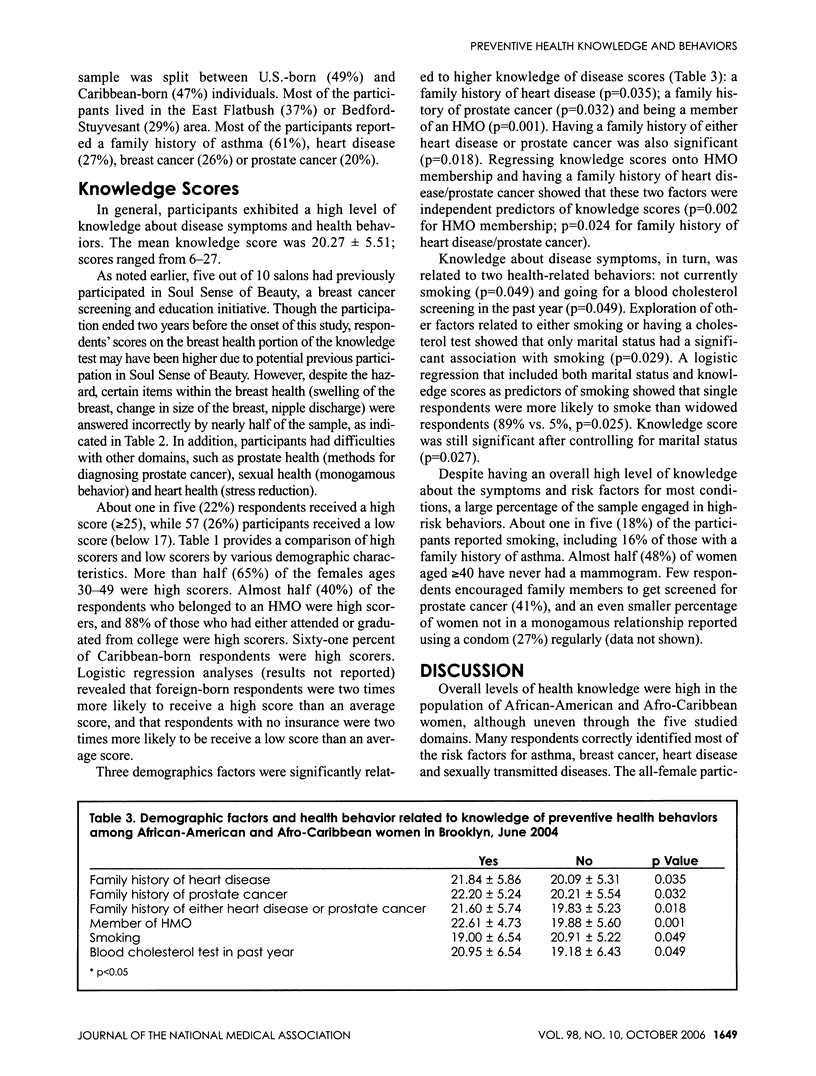
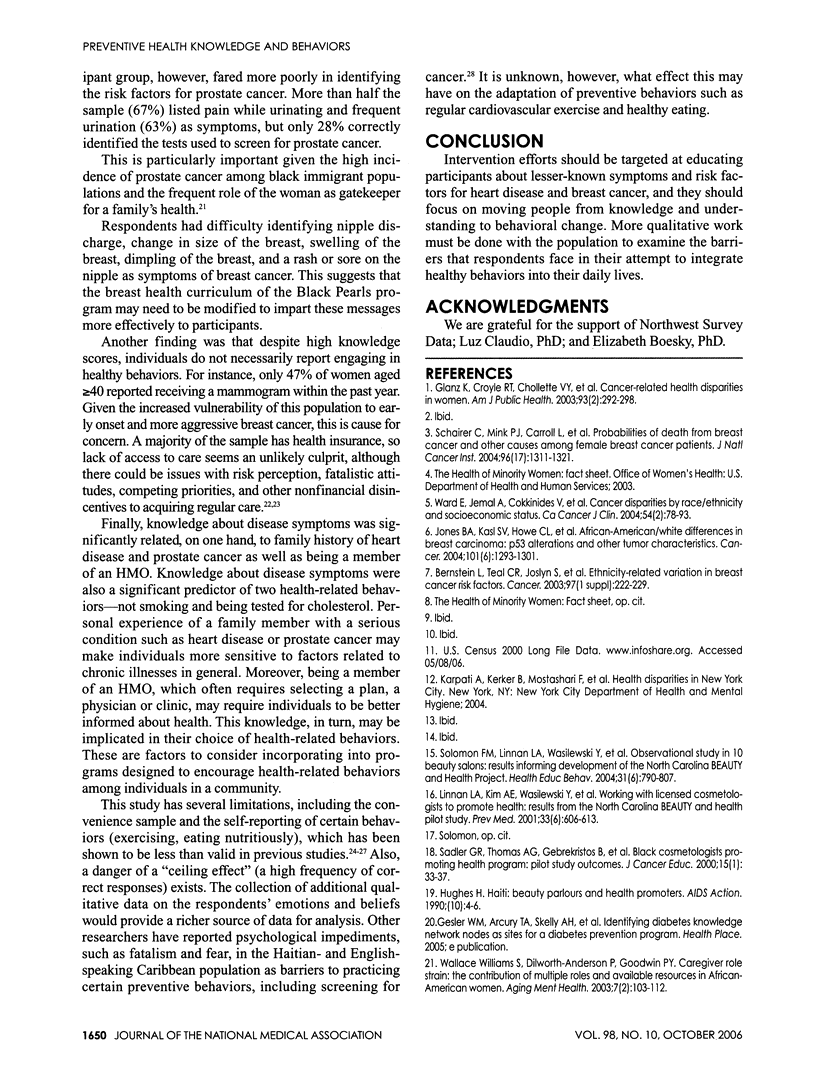
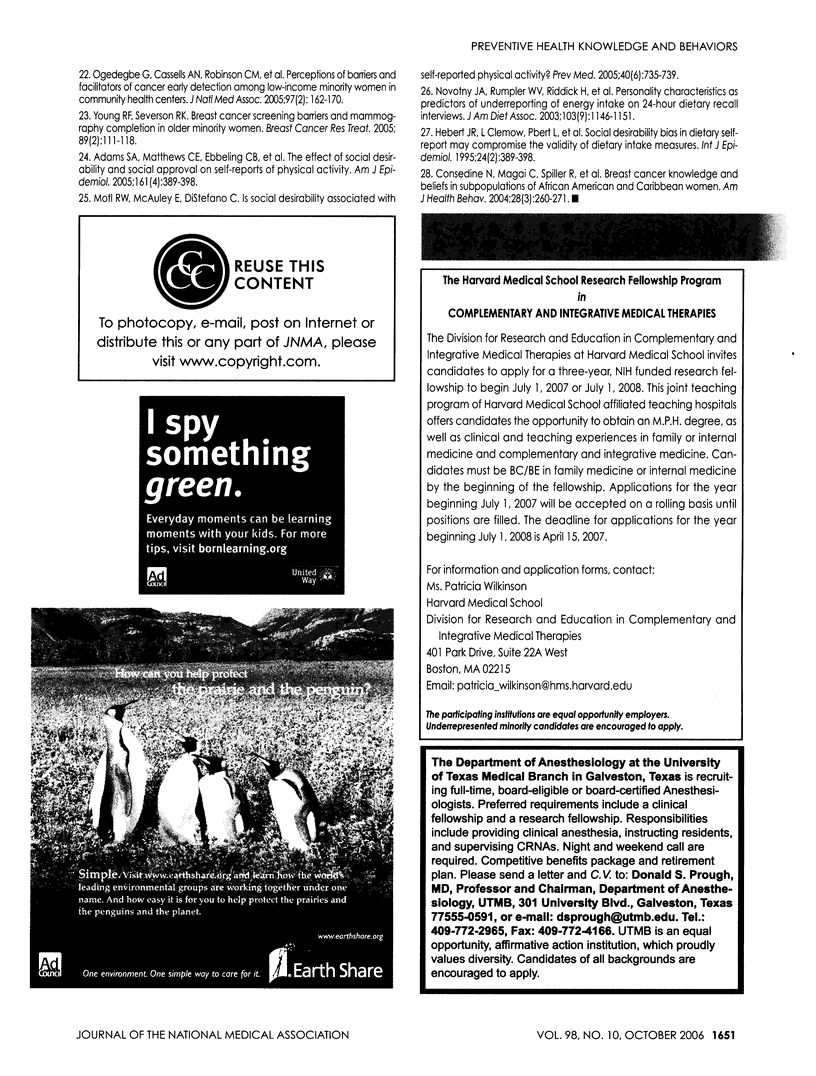
Selected References
These references are in PubMed. This may not be the complete list of references from this article.
- Adams Swann Arp, Matthews Charles E., Ebbeling Cara B., Moore Charity G., Cunningham Joan E., Fulton Jeanette, Hebert James R. The effect of social desirability and social approval on self-reports of physical activity. Am J Epidemiol. 2005 Feb 15;161(4):389–398. doi: 10.1093/aje/kwi054. [DOI] [PMC free article] [PubMed] [Google Scholar]
- Bernstein Leslie, Teal Cayla R., Joslyn Sue, Wilson Jerome. Ethnicity-related variation in breast cancer risk factors. Cancer. 2003 Jan 1;97(1 Suppl):222–229. doi: 10.1002/cncr.11014. [DOI] [PubMed] [Google Scholar]
- Consedine Nathan S., Magai Carol, Spiller Rashard, Neugut Alfred I., Conway Francine. Breast cancer knowledge and beliefs in subpopulations of African American and Caribbean women. Am J Health Behav. 2004 May-Jun;28(3):260–271. doi: 10.5993/ajhb.28.3.7. [DOI] [PubMed] [Google Scholar]
- Glanz Karen, Croyle Robert T., Chollette Veronica Y., Pinn Vivian W. Cancer-related health disparities in women. Am J Public Health. 2003 Feb;93(2):292–298. doi: 10.2105/ajph.93.2.292. [DOI] [PMC free article] [PubMed] [Google Scholar]
- Hebert J. R., Clemow L., Pbert L., Ockene I. S., Ockene J. K. Social desirability bias in dietary self-report may compromise the validity of dietary intake measures. Int J Epidemiol. 1995 Apr;24(2):389–398. doi: 10.1093/ije/24.2.389. [DOI] [PubMed] [Google Scholar]
- Jones Beth A., Kasl Stanislav V., Howe Christine L., Lachman Mary, Dubrow Robert, Curnen Mary McCrea, Soler-Vila Hosanna, Beeghly Alicia, Duan Fenghai, Owens Patricia. African-American/White differences in breast carcinoma: p53 alterations and other tumor characteristics. Cancer. 2004 Sep 15;101(6):1293–1301. doi: 10.1002/cncr.20500. [DOI] [PubMed] [Google Scholar]
- Linnan L. A., Kim A. E., Wasilewski Y., Lee A. M., Yang J., Solomon F. Working with licensed cosmetologists to promote health: results from the North Carolina BEAUTY and Health Pilot Study. Prev Med. 2001 Dec;33(6):606–612. doi: 10.1006/pmed.2001.0933. [DOI] [PubMed] [Google Scholar]
- Motl Robert W., McAuley Edward, DiStefano Christine. Is social desirability associated with self-reported physical activity? Prev Med. 2005 Jun;40(6):735–739. doi: 10.1016/j.ypmed.2004.09.016. [DOI] [PubMed] [Google Scholar]
- Ogedegbe Gbenga, Cassells Andrea N., Robinson Christina M., DuHamel Katherine, Tobin Jonathan N., Sox Carol H., Dietrich Allen J. Perceptions of barriers and facilitators of cancer early detection among low-income minority women in community health centers. J Natl Med Assoc. 2005 Feb;97(2):162–170. [PMC free article] [PubMed] [Google Scholar]
- Sadler G. R., Thomas A. G., Gebrekristos B., Dhanjal S. K., Mugo J. Black cosmetologists promoting health program: pilot study outcomes. J Cancer Educ. 2000 Spring;15(1):33–37. doi: 10.1080/08858190009528650. [DOI] [PubMed] [Google Scholar]
- Solomon Felicia M., Linnan Laura A., Wasilewski Yvonne, Lee Ann Marie, Katz Mira L., Yang Jingzhen. Observational study in ten beauty salons: results informing development of the North Carolina BEAUTY and Health Project. Health Educ Behav. 2004 Dec;31(6):790–807. doi: 10.1177/1090198104264176. [DOI] [PubMed] [Google Scholar]
- Wallace Williams S., Dilworth-Anderson P., Goodwin P. Y. Caregiver role strain: the contribution of multiple roles and available resources in African-American women. Aging Ment Health. 2003 Mar;7(2):103–112. doi: 10.1080/1360786031000072312. [DOI] [PubMed] [Google Scholar]
- Ward Elizabeth, Jemal Ahmedin, Cokkinides Vilma, Singh Gopal K., Cardinez Cheryll, Ghafoor Asma, Thun Michael. Cancer disparities by race/ethnicity and socioeconomic status. CA Cancer J Clin. 2004 Mar-Apr;54(2):78–93. doi: 10.3322/canjclin.54.2.78. [DOI] [PubMed] [Google Scholar]
- Young Rosalie F., Severson Richard K. Breast cancer screening barriers and mammography completion in older minority women. Breast Cancer Res Treat. 2005 Jan;89(2):111–118. doi: 10.1007/s10549-004-1476-8. [DOI] [PubMed] [Google Scholar]


